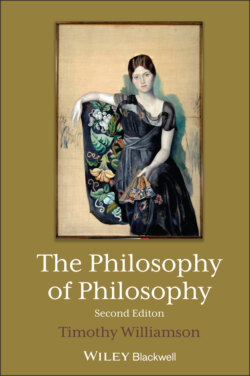Читать книгу The Philosophy of Philosophy - Timothy Williamson - Страница 16
Notes
Оглавление1 1 Ayer’s three immediate predecessors were John Cook Wilson, H. H. Joachim and H. H. Price.
2 2 The “absolute” is to distinguish these forms of idealism from the corresponding ‘subjective’ forms, in which concepts are replaced by psychological processes.
3 3 Although McDowell is sometimes classifi ed as a ‘post-analytic’ philosopher, he fi nds his own way to accept Dummett’s ‘fundamental tenet of analytical philosophy,’ that “philosophical questions about thought are to be approached through language” (1994: 125).
4 4 McDowell’s invocation of humility (1994: 40) addresses contingent limitations, not necessary ones.
5 5 Mark Johnston (1993: 96–7) discusses “the Enigmas, entities essentially undetectable by us.” He stipulates that they are collectively as well as individually undetectable; thus our elusive objects need not be his Enigmas. If we cannot have good evidence that there are no Enigmas, it may well be a waste of time to worry whether there are Enigmas. But it would not follow that it is a waste of time to worry whether there can be Enigmas. Their defi nition does not rule out knowledge of the possibility of such things; such knowledge may itself be philosophically useful (indeed, Johnston uses it for his philosophical purposes).
6 6 On essentialism see, for example, Kripke (1980), French, Uehling, and Wettstein (1986), Fine (1994, 1995) and Wiggins (2001). For a good statement of the outlook of contemporary metaphysics see Zimmerman (2004).
